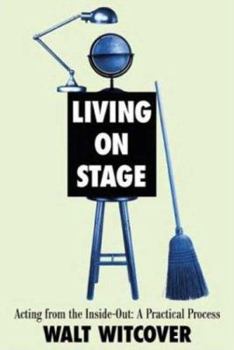Living on Stage: Acting from the Inside Out: A Practical Process
In Living On Stage, actors are invited to take a private master class with one of America's most beloved and respected coaches. Through vivid, highly descriptive language, Witcover lets readers watch... This description may be from another edition of this product.
Format:Paperback
Language:English
ISBN:0823028321
ISBN13:9780823028320
Release Date:April 2004
Publisher:Back Stage Books
Length:224 Pages
Weight:0.85 lbs.
Dimensions:0.6" x 6.3" x 9.0"
Customer Reviews
1 rating
judge your acting teacher by this book's standards
Published by Thriftbooks.com User , 18 years ago
In teaching the arts it's best to separate craft from aesthetics. The best sculpture schools separate the craft projects from projects attempting to create "art." The results of, for example, a clay-materials project are judged according to CRAFT-goal; For example, "Using clay coils, did the student create a series of objects exploiting the plasticity of the coil method?" Not, "did the student create something aesthetically satisfying?" What does this have to do with acting? In the teaching of acting, "aesthetics," (that is, "performance") and craft are so muddled as to be maddening. No one expects a beginning flute player to create satisfying music in the first few tries. The flute player needs to learn basic breath control, she needs to learn how hard to press on the finger holes, yet still be able to move her fingers swiftly. When the craft is solid, then one can start asking for performance. Why then, is performance expected by acting teachers of beginning actors? The actor makes herself vulnerable to the very core of her being before an acting teacher. The result is the acting teacher's opinions are elevated to an all-knowing, almost godlike status. Unless (and sometimes even) when the teacher is outright abusive, acting students will still idolize their teachers---not because they actually taught them how to create a convincing performance, but because of the nature of the performing experience itself. I remember talking to one of Walt's students who had attended Uta Hagen's school. He said he loved Uta and that she was very insightful, but he could see how the other students could've used Walt's training. So, what does that SAY about his training? It's little wonder the actors wind up falling back on the three "P"'s of bad acting: Posing, Prancing and Pronouncing. Or the two "B"'s: Bleating and Bellowing. In summary, there appear to be 3 general kinds of acting teachers: 1) Directors. These are the most damaging kind of teacher. Avoid these like the plague. They attack the teaching process as would a bad director. They expect a performance, or they give external directions which are useless, like "can you give me more brown in that perfomance", or "make it stronger." (As opposed to using material useful for an actor, such as: change the imaginary relationship with your partner, imagine them to be someone close to you that you hate.) 2) Psychoanalysts. These provide a rich environment of self-exploration. This is satisfying, given the intense, self-focused personality of many actors. But it's useless when one is handed a text and asked to create a performance that is "authentic" or "convincing." 3) Coaches. The least damaging, these can diagnose problems in a performance; they can coach a student into a better perfomance. But without the coach, the student flounders. Like any craft, books are very limited in their ability to teach. This book will probably not teach anyone to be an actor. But it will give you some idea of how to j





